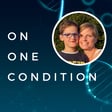Become a Creator today!Start creating today - Share your story with the world!
Start for free
00:00:00
00:00:01

Episode 71: Dariya Butcher - HSP Nephritis
Dariya’s rare autoimmune kidney condition, HSP Nephritis, has shaped much of her childhood and continues to affect her life today. Diagnosed as a child after a long and difficult journey to recognition, Dariya opens up about the physical struggles, hospital experiences, and the lasting impact of her condition. She describes how it affected her mental well-being, leading to PTSD, OCD, and borderline personality disorder. Yet, Dariya speaks with honesty and resilience about how therapy, persistence, and the support of her loved ones have helped her find stability and strength. Today, she works in healthcare herself, bringing compassion and understanding to patients with complex needs.
The song that Dariya chose is Hold My Girl by George Ezra.
Transcript
Introduction to 'On One Condition' and Daria Butcher's Story
00:00:00
Speaker
Hi, I'm Sylvain Bertelot and you're listening to On One Condition, a podcast to raise awareness about health conditions by listening to people who leave them every day. My guest today is Daria Butcher and we're going to talk about HSP nephritis.
00:00:17
Speaker
Hi Daria, thank you for joining me on the podcast. Hi, no thank you for having me. How are you doing today? I'm not too bad, how are you doing? Yes, I'm great.
00:00:29
Speaker
Although summer is over where we are, which always makes me sad. Oh, no, I love autumn. I'm ready for the colder months. Great. Well, I'm glad you're going to enjoy it.
00:00:41
Speaker
So as you know, I love starting with a
Significance of 'Hold My Girl' by George Ezra
00:00:45
Speaker
song. So which song did you choose and why? and So I chose Hold My Girl by George Ezra as my song.
00:00:53
Speaker
When my stepdaughter was born, her father used to sing it to her all the time. And I really love it. And that's the song that we played when we first met.
00:01:05
Speaker
So, yeah, it holds a lot of significance for me. Nice. I like that. It's nice how we tend to sing to our children when they're young. Yeah.
00:01:17
Speaker
We still sing it to every now and again, but yeah, it's lovely. Yeah. Well, that's a great way to start. Thank you. You're welcome.
Understanding HSP Nephritis and Initial Diagnosis Challenges
00:01:26
Speaker
ah So we're talking about HSP nephritis, and that's quite ah an obscure name. So ah why don't we start with an explanation of what that means, if you don't mind?
00:01:41
Speaker
Yeah, sure. HSP nephritis, it often coincides with IgA netheropathy. So it's an autoimmune kidney disease. Well, it's an autoimmune disease. I just happen to have the strain that affects the kidneys.
00:01:56
Speaker
So the immune system can't recognize the difference between its own cells and the pathogens from any virus or bacteria. And it then attacks certain organs in the body.
00:02:09
Speaker
And mine happened to be all the blood vessels, but particularly leading to the kidneys, which unfortunately, as you as everyone knows, it's one of the major organs. So it can then lead to kidney failure.
00:02:21
Speaker
But the main symptom of HSP nephritis is protein and blood. You're lost through urine. Basically, the the body can't remove its own toxins.
00:02:35
Speaker
And yeah it it can be quite painful while when the kidneys shut down. And you're essentially just leaking blood and then your immune system starts to shut down as well.
00:02:45
Speaker
And anything from just a simple cold can be enough to really have a devastating impact on on the body. So, yeah, I was diagnosed with that when I was six, I believe.
00:02:59
Speaker
But it's super rare. I mean, i'm sure kidney consultants at my hospital see it all the time, but it's very rare in terms of what your day-to-day GP would see.
00:03:11
Speaker
Okay.
Diagnosis Confirmation and Biopsy Process
00:03:12
Speaker
And was the diagnosis an easy process or not? It was a bit of a battle, to be honest with you. From what I can remember, obviously, I was just a child when I got diagnosed with it. But the majority of the healthcare professionals that we sought advice from were saying, you know, it's too rare. we don't really get that in the UK, etc.
00:03:33
Speaker
My mum ended up having to actually contact a load of her colleagues who specialised in sort of rare disease and immunologists. And it was only once they had contacted their colleagues at a specialist hospital in Leeds that they agreed to see me. And then the overall diagnosis was confirmed by a ah kidney biopsy.
00:03:53
Speaker
Okay, well, do you know why it so it has to be through a biopsy? I'm not too sure, to be honest with you. i think that's just the way to sort of tick it off and say 100% that this is what it is.
00:04:08
Speaker
I think they can somehow analyse the actual kidney tissue and to see that there's been damage on it or they've got to see that it's a certain level of of protein. I know that to check your kidney function, they have to do a creatine profile. So I think they were able to see that mine was severely raised.
00:04:30
Speaker
Okay. So you mentioned that your kidneys do not work properly and so you can't get rid of toxins as everyone else
Managing HSP Nephritis through Diet and Lifestyle
00:04:40
Speaker
does? Yeah. I mean, so luckily my, my HSP nephritis is, is quite stable and dormant, which is amazing. But yeah, I still leak blood and protein on a daily basis and my immune system is still autoimmune. So it is impaired. So I can't clear out everyday toxins that you get from food and air like everybody else can.
00:05:04
Speaker
And then it leaks into and my urine. And it's a bit TMI, but that's how you can test it. So yeah, I'm not as ah strong as everyone else. Okay. And does it mean that you need to follow any specific diet, for example?
00:05:20
Speaker
Not so much these days, but as a child, I was put on various different diets just to see what would help my immune system. I was gluten free for a long time, as they seem to find that that sort of triggered the antihistamines in my body to overreact and attack myself.
00:05:38
Speaker
And then there was also minimizing milk, ah especially chocolate, anything like that. I do find these days, although I am quite free to eat kind of normally. If I have certain like protein heavy foods, it can make me feel quite poorly the next day. And I do notice that when I do my own urinalysis that my proteins and bloods are quite high.
00:06:05
Speaker
I try not to drink alcohol a lot because of my kidneys being impaired. and I don't want to put more pressure on them. That's interesting in terms of like what you said about protein heavy food. So what does that mean when you're not feeling very well the next day? so What's your body doing in a way?
Childhood Symptoms and Impact on Schooling
00:06:28
Speaker
The main symptoms for me is is pain. It's kind of like if you've had flu or you're feeling virally, you can't quite put your finger down on it. I mean, that's me now, 20 so years on, and having relatively stable health. But as a child, it would mean sleeping a lot, fevers,
00:06:51
Speaker
Basically, my urine would be tar black because I was just leaking blood and protein, really swollen joints. I think at one point I was seven or eight and my mum still had to push me around in the pram.
00:07:05
Speaker
because I couldn't walk because everything was that painful. and You also get something called purpura, which is a type of rash. It's mainly found on the arms, the torsos and the ankles.
00:07:21
Speaker
And that's another sign of the the body attacking itself. So, yeah, because it attacks the blood vessels after certain triggers, the main trigger is pain around the joints, and nausea,
00:07:33
Speaker
just general flu-like symptoms but sort of times 10 and that's the only way i can sort of describe it. Yeah yeah it's quite difficult to describe pain isn't it? It is yeah.
00:07:46
Speaker
So it doesn't just impact your kidneys then because you're also describing an impact on your joints.
Vascular System Effects and Related Conditions
00:07:55
Speaker
Yes, so because it's vascular nephritis, so yes, it mainly attacks the kidneys, which was my renal consultant's main cause of concern, but it affects all the the blood vessels in the body.
00:08:09
Speaker
It's a bit of a weird one for me because i have HSP nephritis and IgA nephropathy, but I also have a vascular engagement as I had this disease when I was very young called Kawasaki's, which is a type of vasculitis.
00:08:24
Speaker
And as I'm sure you've heard, when you have one immune condition, it sort of triggers a domino effect and you end up collecting quite a few. So they're all interplaying. But my blood vessels swell up, causing quite a significant amount of pain. If you could imagine what it's like if you have gastric flu, that sort of tender feeling, bruising feeling. But I have it everywhere. I do mainly have it unfortunately when it does flare up in my stomachs like my large intestine small intestine anything like that I mean I used to complain of such excruciating stomach ache as a child but you know it's quite difficult to communicate that as an infant and they were trying to fob you off and then eventually when they did do a scan of my stomach they said to my mum oh my god no wonder she's in so much pain and everything's so severely swollen
00:09:17
Speaker
Wow. So it sounds like it's really affected you badly in your childhood. Yeah, definitely. How did you leave it? Did it impact your ability to go to school, for
Hospital Stays and Lack of Support During Childhood
00:09:33
Speaker
example? Yes, did. Did you spend time at the hospital and so on? I spent quite a large portion of my childhood in and out of hospitals. Mm-hmm.
00:09:44
Speaker
I mean, I was lucky I was never one of those kids, you know, who who lived on it for years and years or months and months, but there was weeks on the ward and then I'd come home and then I'd get something else and it would be another few weeks on the ward. And yeah, it massively impacted me being able to have a normal childhood. I mean, I could barely attend primary school.
00:10:05
Speaker
because I was so ill. But instead of people being sympathetic to that, the council in school decided to send my mum threatening letters saying, do you know your child is not at school? And she's there going, yes, I'm i'm well aware my child's very, very seriously ill. I'd love for her to be at primary school and being like the other kids.
00:10:25
Speaker
But she can't because she can't get out of bed right now. So it was made very difficult. So there was no treatment for you then
Treatment Approaches and Mother's Influence
00:10:35
Speaker
available? So with HSP nephritis, I mean, the very early days, I don't remember that much.
00:10:44
Speaker
But I think at a certain level, it's mainly monitoring and treating whatever symptoms you have at the time. So I think one of the options was immunosuppressants.
00:10:57
Speaker
And that was for the more severe end. I'm not sure if I ever had immunosuppressants. I just remember lots and lots of, you know, different doctors prodding and tablets and e etc.
00:11:09
Speaker
I remember being on antibiotics quite often, which as you can imagine is not great for the body because you become sort of tolerant to certain ones. So there's always a concern, especially in the early noughties, about antibiotic resistant bacteria, MSRA, etc.
00:11:29
Speaker
At one point, my mum did try sort of homeopathic treatments. I don't remember exactly what it was. I just remember seeing this... doctor and him giving me a little tablet but that seemed to help but the main treatment for hsp as far as i'm aware is pain management possibly immunosuppressants diet control and then you know unfortunately some people it gets to the point where they do need an organ transplant if the the kidneys are damaged or okay other methods to treat kidney failure i'm very lucky that
00:12:05
Speaker
I never got to that stage. I mean, there was a few occasions that did get really bad, but my mum sort of tried everything in her power for what she knew to try and control the disease. so ah My mum's Russian, so she was very much into like keeping me warm, keeping me at home, healthy organic food, nothing that would trigger my immune system. i mean, looking back now, yeah, people probably thought she was a bit fussy.
00:12:32
Speaker
But, you know, I'm here 27 years old. I still have HSP, which is really unheard of, it going into adulthood. And I'm still managing to live a relatively normal life.
00:12:44
Speaker
Okay.
Mental Health Impact and Therapy for PTSD and OCD
00:12:45
Speaker
That's interesting. that this relation to healthy food having such a positive impact. Yeah, definitely. So going back to to your childhood, has it had any lasting impact on you?
00:13:03
Speaker
Oh, definitely. i was diagnosed with borderline personality disorder when I was 19. nineteen and And since then, I've also accumulated quite a few other mental health conditions.
00:13:16
Speaker
I've got PTSD. um ocd which is under control now but the the type of ocd it was was called a primary ocd so it's not so much about like cleaning or you know infection control or anything like that can be whatever obsession a person has at the time and it's quite closely linked to psychosis or psychotic episodes The main trauma, and when I've spoken to, you know, like professionals and psychiatrists, therapists who have been absolutely amazing, by the way, i would definitely recommend it to anybody who's going through any problems, say that the the root of the trauma really began being in hospital.
00:13:58
Speaker
And because I had such a negative experience of it, it was very traumatizing physically and mentally as well.
00:14:09
Speaker
Okay. Do you know what the bad experience was? What was it related to? There are so many numerous ones. I mean, of course, from, you know, any child who's in pain and sick, that's traumatic enough.
00:14:23
Speaker
But there are several ones that distinctly stay in my memory. I remember being at my local hospital and my mum, bless her, I don't know she had to go to work or she had to move her car or something because it it's just it was just me and my mum. My mum was a single parent growing up and mum i asking one of the nurses or something to to watch me and of course they didn't and i ended it up wandering around the hospital and somehow finding myself
00:14:57
Speaker
Oh, wow.
00:15:01
Speaker
and seeing some quite traumatic stuff i think i remember was a guy in a bed covered in blood and several doctors around him and he had his own tongue in his hand that was just one example A old lady screaming on the corridor in her own urine, calling for help and being ignored by a group of nurses, eating some biscuits.
00:15:24
Speaker
That was another one. Having tubes forced down my throat to force feed me some medicine, which I'm sure there was a reason that they did it. They were trying to do some sort of investigative stuff.
00:15:36
Speaker
But a child, when you've got two grown men holding you down and trying to shove tubes down your esophagus is quite, traumatising. So yeah, those were some of the the highlights of my hospital experience, if you will, but and mainly just my mum getting essentially bullied by the NHS and them telling her that she's crazy, I'm crazy, there's nothing wrong with me.
00:16:03
Speaker
But at that point, my skin had already started to peel off my hands and had fever to the point where I needed to have aspirin because I was convulsing. Yeah, it wasn't great. It wasn't a great experience.
00:16:17
Speaker
Wow, that sounds horrendous. Yeah, it was. Don't get me wrong. like I'm so grateful for NHS and like I work in healthcare and I think it's absolutely amazing. But at that time, where I lived...
00:16:33
Speaker
it was just not well managed at all. i How does your PTSD affect you? It affected me a lot more in my late teen years and my early 20s.
00:16:47
Speaker
I've had quite a lot of therapies since then and I am on medication which allows me to to control it so I am really lucky in that sense but when it was really bad I had extremely bad anxiety, OCD, ruminating thoughts, intrusive thoughts and flashbacks all the time at one point i don't think I could quite tell the difference between sort of real memories and fake memories and they all got intertwined with you know traumatic hospital experiences wasn't very good i mean when i was in my first year at university the the second university I went to I think I spent most of my time in my room living inside my own head wow
00:17:37
Speaker
Yeah, it's it's quite scary because the the brain is so powerful and it can make you believe whatever it wants you to. yeah At the time, you know, people just saying, oh, it's just really, really bad anxiety, blah, blah, blah. But from what I know, working in healthcare and now, it was a it was psychosis.
00:17:55
Speaker
And I did ended up going on antipsychotics for a while. Yeah. Having a lot of therapy, which was amazing. I had EMDR therapy, which is, I think it's like rapid eye movement that you have during the REM part of sleep to process traumatic events.
00:18:09
Speaker
And that massively improved for me. Yeah, just reckless behavior, really, because you're just trying to quieten down whatever's going inside your head.
00:18:23
Speaker
And yet you still managed go through university and you're now working for the NHS. I did, yeah, somehow. That's quite incredible. Thank you. Yeah, I mean, I think I'm just stubborn.
00:18:35
Speaker
So I made myself finish my course, which i' I am really proud of myself, and go through therapy. And yeah, I'd say like mental health-wise, you know, I'm always going to have it, but I am mainly in remission and I'm old enough now to know what triggers me and and how to control it.
00:18:56
Speaker
Yeah. Could you tell me a bit more about the therapy you went through? the The PTSD and the OCD... weren't massively infecting me but the it's the borderline personality disorder that sticks with me it's a personality disorder that responds really on like the abandonment fears which was definitely triggered from hospital of like being taken here there and everywhere and going in and being away from my mom and you know
00:19:29
Speaker
being with strange adults so that's where that formed I think there is a certain genetic level to obviously you know like it does run in my family's mental health problems but the borderline personality disorder sort of gave way to the development of the PTSD and the the OCD and vice versa but I first had just like talking therapy and cognitive behavioral therapy and which didn't really work on me because it's mainly designed for people who, you know, have your depression and anxiety, general anxiety disorder, which for them, if it works, brilliant, that's great.
00:20:05
Speaker
Didn't work for me because I've got a personality disorder. So my actual whole being is not neurotypical. what would work on normal people just doesn't work on me.
00:20:18
Speaker
and I also have seizures, but I'm not epileptic. And through quite a lot of investigating, they found that i had something called non-dissociative seizure disorder, which means that my seizures or episodes or whatever you want to call them,
00:20:33
Speaker
I'm more likely to be related to my PTSD. And it was actually having these seizures that allowed me to access therapy. Because as you probably know, it's quite difficult to get help with mental health on the NHS at the moment.
00:20:48
Speaker
It was only when I started having physical health problems that was able to access proper mental health help. So I had psychodynamic therapy. I had EMDR therapy privately, which I was so lucky to be able to access. And that was the one that helped me the most. It's really, really horrible to go through.
00:21:11
Speaker
is to physically have to go through it again. So you're forced to recall all of this trauma whilst also inducing rapid eye movement to allow the body to process what's happened to it.
00:21:21
Speaker
I also read a great book on trauma. It's called The Body Remembers. And even though, you know, the brain might scatter, it might block stuff, it might push it down.
00:21:33
Speaker
the actual physical body will always hold that trauma in. So a lot of people who've gone through traumatic experiences but don't have really good recollection of them, they can develop health problems because their body is still holding on to everything that's happened to them.
00:21:47
Speaker
Yeah. If that makes sense. It does. Yeah, yeah, yeah. Yeah, so a combination of therapy, and finding the right one for me, and going through a lot of medication to find the right one.
00:22:03
Speaker
Yeah, it was a trial and error kind of thing. Some medication... you know everyone's different it works great for one person and one person can say I've been on that that that worked wonders for me and then I try it and um it sort of zombified me out but eventually I found the right one for me and it's just about adjusting the dose and having therapy at the same time that allowed me to control my mental health yeah and how old were you when you went through therapy I started having like counselors and stuff at school when I was like
Long-term Health Management Strategies
00:22:39
Speaker
11, 12.
00:22:40
Speaker
So I would say that, you know, it kind of began then. But I started having sort of professional therapy and psychiatrist and involvement from 16, I would say.
00:22:52
Speaker
okay But I didn't really have anything that helped me until I was about 20. Yeah. Wow. So all through a age where you're already trying to find yourself and yeah and define your your place in society. So it must be very, very difficult to go through all of this.
00:23:16
Speaker
Yeah, I mean, ah i didn't know any difference. So my my entire childhood had been spent being physically ill in hospital and now I've spent my adolescent years just being mentally ill in hospital. So it was just a continuation, really.
00:23:30
Speaker
Yeah. yeah Now you you said that you're you're managing your HSP now. hu Do you know if anything inside you has changed physically or is it mainly through following a specific diet and and so on?
00:23:51
Speaker
I'm not too sure really. I mean, with HSP, it is mainly a childhood disease. So my consultants were always telling me probably will grow out of it.
00:24:02
Speaker
They see all the time where really, really bad with their paediatric patients. And then it so tends to resolve itself in adulthood or it gets really bad at paediatrics and those people end up developing kidney failure and needing dialysis.
00:24:16
Speaker
I think in my case, mean, I'm not a doctor, Yeah, I've grown out of it. But that's been helped by kind of shielding health wise as growing up, trying to follow a good diet. I mean, like I'm wrong, my diet's not like as amazing as it was when I lived with my mom.
00:24:39
Speaker
But in those sort of really important years, she made me stick to a really strict diet plan, which I do think helped my body recover. And now it is just avoiding my triggers.
00:24:51
Speaker
I still have my problems. I still can't avoid getting burnt out and my body sort of attacking itself. But it's about managing it and knowing when to rest, if I can rest.
00:25:03
Speaker
And is work flexible?
Challenges in the Workplace
00:25:06
Speaker
Do they understand that there are days that you may not be able to go to work, for example? Honestly, is difficult managing any kind of health condition with work, any kind of work, no matter what sector you're in.
00:25:21
Speaker
Because as much as, you know, companies and the government want to tell you, well we we're all pro-disability and pro-helping people with health conditions, No, they're still going to put profits above people. You can be ill to a point and then you just start being an inconvenience to people, even within the and NHS, you know, and and they're about helping people.
00:25:44
Speaker
And yet you don't look after your own staff. That's what I found anyway. Some jobs have been absolutely brilliant. I worked for a ph so pharmaceutical company a few years ago, and ah health research company, and they were really, really understanding, and allowing me sort of time off to go to appointments. I mean, I worked remotely at that time, which...
00:26:05
Speaker
really, really worked for me. And they were brilliant. Absolutely amazing. As I'm working more in in surgery, and I'm sort of in a patient facing role, and I'm on my feet all day. yeah it is difficult. It is really difficult because they don't seem to understand what why it is that I get ill so often and that I'm not trying to, you know, have sick days because I think it's fun.
00:26:31
Speaker
And, you know, ultimately you don't get paid when you're off sick, not in my business anyway. So it doesn't work out for me to be ill and I don't want to be ill. Yeah, it' say it's more penalised than anything. You get penalised more for having a health condition than you do support.
00:26:47
Speaker
I think it is changing, I think there's a long way to go. Yeah, and those kind of changes take time. Yeah, absolutely. And I think it is a lack of people understanding because a lot of people in management, their concept of pain or illness is a headache, flu. yeah and People who haven't experienced long-term chronic health conditions or you know pain on a level that is debilitating will not understand those who do.
00:27:17
Speaker
Until you've experienced it, you just don't get it. No, no. And hopefully by raising awareness, we we help a bit on this on this path.
00:27:27
Speaker
Absolutely.
Motivation to Pursue a Healthcare Career
00:27:29
Speaker
Did you end up in in this career because of your health issues? Yeah, I think so. I think being in and out of hospital and and listening to all these super clever, amazing doctors and nurses who have helped treat me really sort of from a young age made me fascinated about medicine.
00:27:52
Speaker
But at the same time, all the doctors and nurses who didn't help me and sort of belittled me and my mum and told me there was nothing wrong they've also fueled my interest in it to sort of yeah prove them wrong and you know there's nothing wrong with you well why do I feel like this I'd go off and learn more about it myself and get different opinions and yeah I was sort of inspired to help people because of both the good and bad experiences that I had growing up Wow, that's nice. I'm sure you can relate to patients a lot more having lived it yourself. Yeah, definitely. And I love working with patients who've got sort of more complex health needs.
00:28:36
Speaker
I mean, im I'm a dental nurse at the moment, which is a really great job. You get to meet people from all over.
Empathy and Medical Advancements
00:28:42
Speaker
But being able to help people, you know, especially with anxiety and phobias or ah people with autism and learning difficulties and being able to just sort of go with the extra mile and understand, you know, i get that you've got different needs.
00:28:56
Speaker
and I'm trying to accommodate you as much as possible because you still get a lot of people nowadays who just think that, know, people are being sensitive or I hear the word snowflake a lot, you know, or it never existed in my day. Well, yeah, medicine wasn't as advanced 20 years ago.
00:29:15
Speaker
Yeah, and thankfully that's evolving.
Finding Peace at Home with Family
00:29:18
Speaker
e i have one last question for you, which I love asking everyone. What's your happy place?
00:29:27
Speaker
place where you feel at peace? Oh, my happy place. I'd say my actual happy place is being at home, cuddled up on the sofa with my my stepdaughter and my partner.
00:29:45
Speaker
and just having a really good film on, and us all being together, and safe, and happy, and yeah, that's my happy place, it's simple, it's peaceful, it's just us in our little bubble.
00:29:58
Speaker
Nice, that sounds very homely. It does, doesn't it? It sounds very homely, and um and ah quite cute. Yeah, yeah. oh Well, thank you so much, Daria.
00:30:12
Speaker
I was about to say, it sounds like you've been on quite a journey, but you have been on quite a journey. Yeah, tumultuous one, that's for sure. Yeah. But at the same time, there's so much maybe peace that comes out of the way you talk about it and and strength at the same time.
00:30:32
Speaker
It's quite incredible. Thank you. i appreciate that. I'm glad you're like, it sounds like you're very managing it very well and and able to be active still. So that's, that's amazing.
00:30:46
Speaker
Yeah. I'm one of the lucky ones. Well, yeah. Thank you so much for sharing and raising awareness. And I'm sure as we said, patients must appreciate having you by their side.
00:31:00
Speaker
Oh, thank you so much. Thank you for having me and like letting me tell my story and just raising awareness with your podcasts. It's an absolute pleasure. Thank you.



















